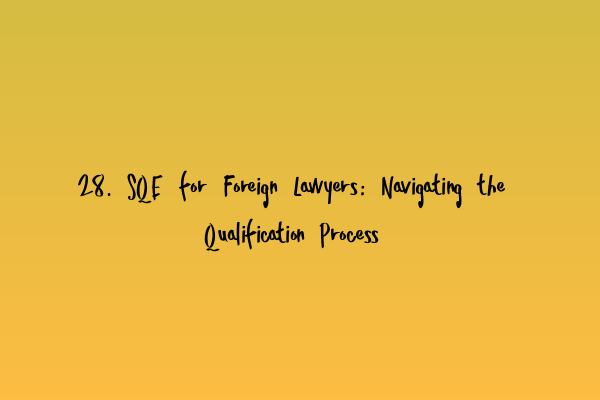28. SQE for Foreign Lawyers: Navigating the Qualification Process
Are you a foreign lawyer looking to practice in the United Kingdom? The process of qualifying as a solicitor in the UK may seem complex and overwhelming, but with the introduction of the Solicitors Qualifying Examination (SQE), it has become more accessible and streamlined for foreign lawyers. In this article, we will guide you through the qualification process, providing you with the information you need to successfully navigate the SQE and achieve your goal of practicing law in the UK.
Understanding the SQE
The SQE is a new, two-part assessment that foreign lawyers must pass in order to qualify as solicitors in England and Wales. It has been designed to replace the traditional pathways to qualification, such as the Qualified Lawyers Transfer Scheme (QLTS) and the Legal Practice Course (LPC).
The first part of the SQE, known as SQE1, focuses on testing candidates’ functioning legal knowledge. It covers topics such as contract law, criminal law, property law, and professional conduct. This assessment consists of multiple-choice questions and is highly objective in nature.
The second part, known as SQE2, tests candidates on their practical legal skills. It includes tasks such as client interviewing, advocacy, legal research, and legal drafting. This assessment is designed to assess candidates’ ability to apply legal knowledge in realistic scenarios.
It is important to note that the SQE is open to both UK and foreign lawyers, making it a viable option for those seeking qualification as solicitors in the UK.
Preparing for the SQE
Preparing for the SQE requires a strategic and focused approach. As a foreign lawyer, you may already possess a strong foundation in certain areas of law, but it is essential to ensure that you have a comprehensive understanding of the specific areas covered in the SQE syllabus.
One valuable resource for preparing for the SQE is the SQE Exam Law website. This website provides a range of articles and resources that cover key topics in contract law, criminal law, property law, and more. In particular, the following articles may be helpful in your preparation:
- Parties in a Contract: Rights and Responsibilities
- Unveiling Duress and Undue Influence in Contracts
- Essentials of Consideration: Understanding the Backbone of Contracts
- Express and Implied Terms in Contracts: Decoding Agreement Components
- Breach of Contract: Remedies for Contractual Violations
These articles delve into key concepts and provide in-depth explanations, helping you develop a strong understanding of the relevant legal principles. Additionally, the website offers practice questions and sample answers to enhance your knowledge and refine your exam technique.
As you prepare for the SQE, it is also beneficial to enroll in an SQE preparation course. These courses are specifically designed to provide foreign lawyers with the necessary knowledge and skills to excel in the examination. They offer comprehensive study materials, mock assessments, and expert guidance to ensure that you are fully prepared and confident on exam day.
Taking the SQE
When you feel adequately prepared, you can register for the SQE and schedule your examinations. The SQE is administered by the Solicitors Regulation Authority (SRA) and takes place at designated assessment centers.
It is crucial to familiarize yourself with the format and structure of each assessment before exam day. Understanding the types of questions you will encounter and the time limits involved will help you manage your time effectively and perform to the best of your abilities.
During the examinations, it is essential to read each question carefully and provide well-reasoned and substantiated answers. Remember to draw upon your legal knowledge and apply it to the given scenarios. Effective time management is key, so allocate your time wisely across the various tasks.
After completing both parts of the SQE, your assessments will be graded, and you will receive your results. If you pass both parts, congratulations! You are one step closer to qualifying as a solicitor in the UK. However, if you do not achieve a passing grade, do not be discouraged. You have the opportunity to retake the assessments and improve your results.
Conclusion
The SQE provides foreign lawyers with a clear path to qualifying as solicitors in the UK. By understanding the structure of the SQE, preparing effectively using available resources, and approaching the assessments strategically, you can successfully navigate the qualification process. Remember to stay focused, stay motivated, and stay confident in your abilities. Good luck on your journey to becoming a qualified solicitor!
